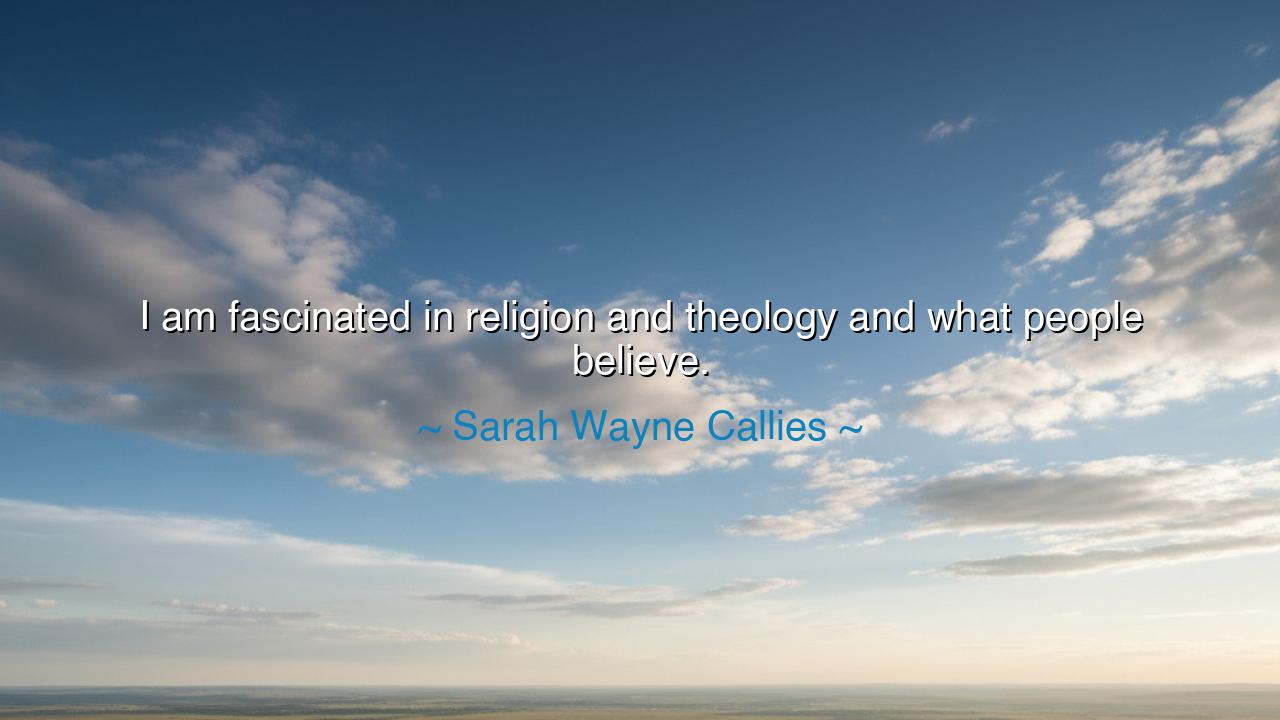
I am fascinated in religion and theology and what people believe.






When Sarah Wayne Callies said, “I am fascinated in religion and theology and what people believe,” she spoke not as a scholar or cleric, but as a seeker — one who hungers to understand the mysteries that shape the human soul. In her words, there is no judgment, only curiosity — that sacred yearning which has driven humanity from the dawn of consciousness. To be fascinated by belief is to gaze into the heart of what makes us human, for beneath every ritual, every prayer, every doctrine, lies the same eternal question: Why are we here?
The origin of this quote lies in the quiet introspection of an artist, a woman whose craft depends on empathy and understanding. As an actress, Callies has portrayed lives unlike her own, stepping into the shoes of others and breathing their hopes and fears. Such work demands a soul that listens, not only to words but to the faiths that sustain them. Her fascination with religion is not about allegiance to one creed, but about the human spirit’s endless search for meaning — the invisible thread that binds all peoples and cultures through time. She reminds us that to explore what others believe is to honor the shared humanity within belief itself.
In this, she stands in the company of the ancient philosophers, who, though separated by lands and ages, sought the same wisdom. Socrates wandered the streets of Athens questioning what others held sacred, not to mock them, but to awaken them. Marcus Aurelius, the Roman emperor, wrote in his meditations of the divine reason that dwells within all men. And Rumi, the Sufi poet, sang, “The lamps are different, but the Light is the same.” Each of these voices, like Callies’s, was fascinated by belief — not for the walls it builds, but for the windows it opens. To study what others hold sacred is to draw closer to the universal light that burns through every form of faith.
This fascination is not idle curiosity; it is an act of reverence. For when one seeks to understand another’s belief, one enters holy ground — the inner sanctuary of their soul. Every creed, from the quiet prayers of the Buddhist monk to the hymns of the Christian choir, is a map of the human heart’s longing for the divine. To explore these paths without arrogance is to participate in the oldest conversation known to man — the dialogue between the mortal and the eternal. In that dialogue, even the doubter becomes a pilgrim, for to question sincerely is itself a form of devotion.
History offers us the example of Mahatma Gandhi, whose fascination with religions shaped his philosophy of truth and nonviolence. Born a Hindu, he read the Bhagavad Gita, the Quran, and the Bible with equal reverence. He saw beyond the divisions of creed and perceived a unity that transcended them all — the conviction that every faith, rightly lived, leads to compassion. Gandhi’s reverence for belief — even when it was not his own — became a weapon stronger than the sword, binding millions in peaceful resistance. His life teaches us that fascination with belief can become a bridge between hearts, where dogma once built walls.
Yet, in our age, many have lost this sacred curiosity. We are quick to defend what we believe, but slow to listen to what others hold dear. Sarah Wayne Callies’s words remind us that fascination — the willingness to ask, to learn, to wonder — is not weakness, but wisdom. It is the spirit of peace disguised as inquiry. For conflict often begins where curiosity ends. When we cease to ask “Why do you believe?” and begin instead to say “You are wrong,” the world grows smaller, and the soul grows cold. But when we approach others as students of their truth, we become larger — vessels capable of holding more of the world’s mystery.
Let this, then, be the lesson for those who walk the path of understanding: seek to be fascinated, not fearful. Study what others hold sacred; ask with humility; listen with the heart. Do not look for agreement, but for insight. You will find that every belief — even those far from your own — contains a reflection of the same divine longing, the same desire to find order in chaos, meaning in suffering, and love in the vastness of creation.
For in the end, as Sarah Wayne Callies reminds us, fascination with belief is not about religion alone — it is about humanity itself. To be fascinated by what others believe is to see in them a mirror of your own search for truth. It is to walk through the gardens of the soul and find, in every faith and every heart, the same unspoken prayer: to know, to love, and to belong to something greater than ourselves.






AAdministratorAdministrator
Welcome, honored guests. Please leave a comment, we will respond soon